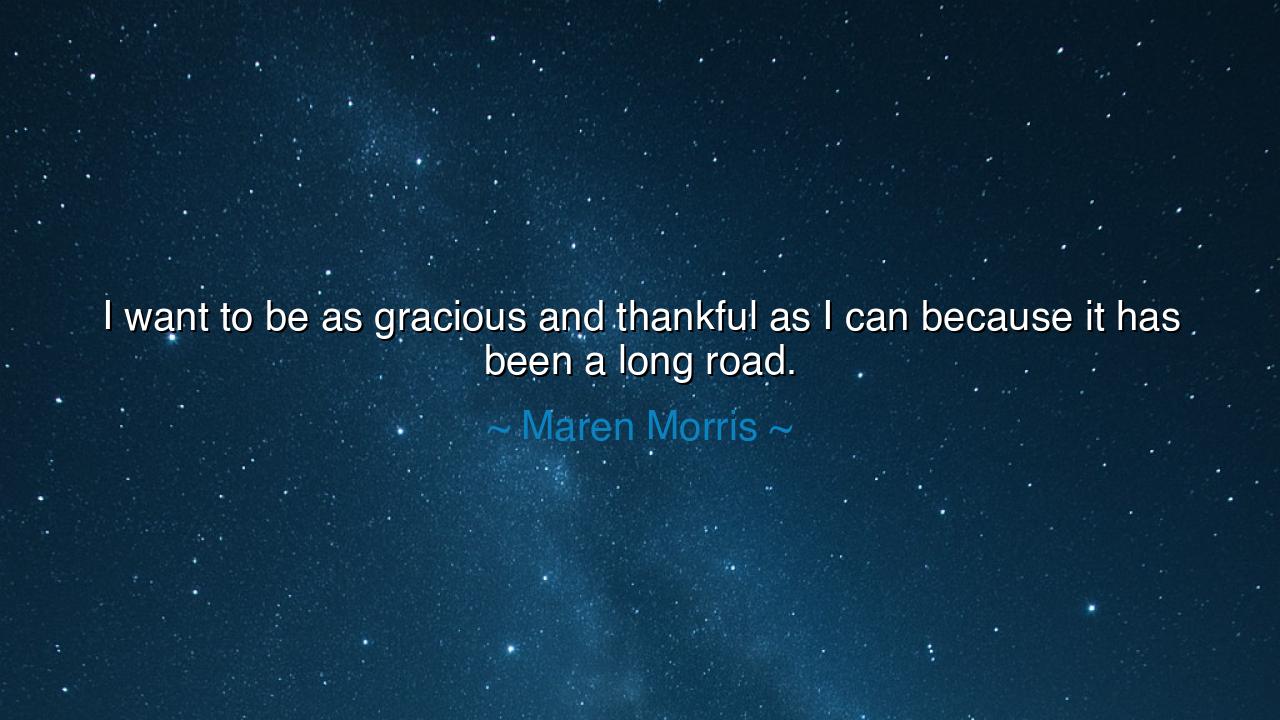
I want to be as gracious and thankful as I can because it has






Hear the words of Maren Morris: “I want to be as gracious and thankful as I can because it has been a long road.” These are not the words of one who has walked an easy path, nor of one who takes her blessings lightly. They are the words of a soul who has labored through trial, endured seasons of doubt, and emerged into the light with humility rather than arrogance. Within them lies the truth that gratitude shines brightest not at the beginning of the journey, but at its end, when the weary traveler looks back and sees how far they have come.
The origin of this reflection is in the hard pilgrimage of a life in music. Maren Morris, before she stood upon great stages, traveled the winding path of rejection, obscurity, and endless striving. “The long road” is not a mere metaphor—it is the lived reality of years spent sowing seeds with no promise of harvest. Thus, when she speaks of being gracious and thankful, her words come not from comfort but from survival. She has learned that to endure the long road and still bow in humility is greater than fame itself.
The ancients knew such wisdom well. Think of Odysseus, who journeyed ten years across perilous seas before he returned home. He did not emerge unscarred, but he emerged alive, and the very weight of his trials made him cherish home more deeply than he ever could have before. In the same way, Morris reminds us that the depth of gratitude is proportionate to the depth of struggle. Those who have walked through deserts will rejoice all the more when they find water.
There is also in her words the lesson of grace. To be “gracious” is to walk gently upon the earth, to carry one’s victories without boasting, and to treat others with kindness even when success has finally come. Many who climb the mountain grow arrogant, scorning those still below. But Morris’s heart turns instead toward humility, choosing to see her blessings not as entitlements but as gifts. Grace, coupled with thankfulness, becomes the crown of the truly wise.
Her words also teach the necessity of endurance. “The long road” is a phrase heavy with fatigue, yet also filled with triumph. It reminds us that the great achievements of life are not built in moments of ease, but in countless days of unseen effort. To give thanks after such a road is to recognize that every hardship was a teacher, every obstacle a stepping stone. Without the difficulty, the destination would hold no meaning. Thus, gratitude transforms struggle into sacred memory.
What lesson, then, must we carry? That we too must strive to be thankful and gracious, especially when our journeys are long and heavy. Gratitude must not wait for ease; it must be cultivated even through weariness. For it is gratitude that keeps the heart soft, that prevents bitterness from taking root. And grace must not wait for victory; it must be practiced along the way, so that when we arrive, we stand not only as conquerors, but as examples of humility.
Practical actions flow from this wisdom. Each day, take a moment to look back upon your own “long road.” Name the struggles, the setbacks, the sacrifices—and then give thanks, not in spite of them, but because of them. Practice graciousness by extending kindness to those who walk behind you on the same road. Share your victories without pride, remembering that all triumphs are stitched with the thread of struggle. In this way, your life will shine not only as a story of success, but as a testimony of endurance, humility, and thankfulness.
Thus, let Maren Morris’s words endure: “Be as gracious and thankful as you can, because the road is long.” For the long road is the path of all who seek greatness. And only those who walk it with humility, gratitude, and grace will find that their journey, however hard, becomes not only a personal victory but a light for others to follow.






AAdministratorAdministrator
Welcome, honored guests. Please leave a comment, we will respond soon